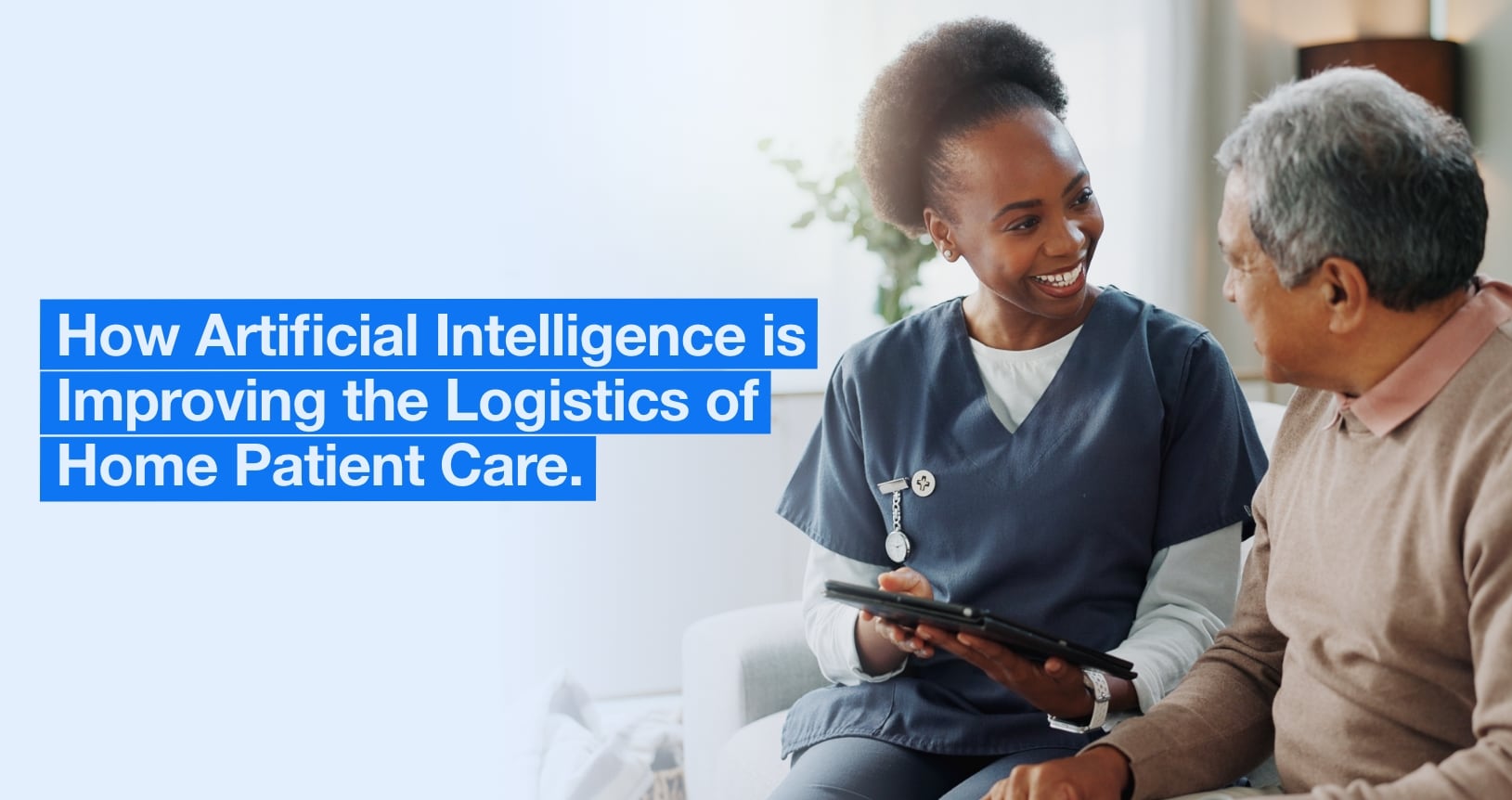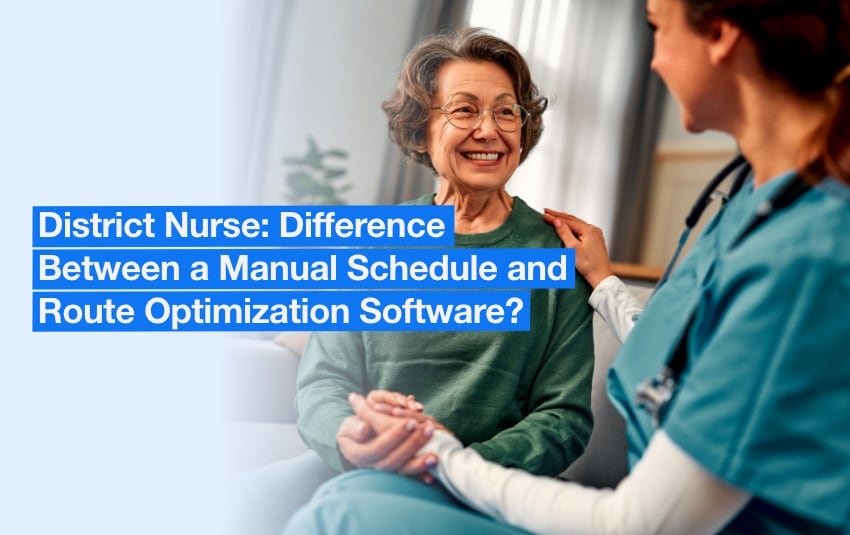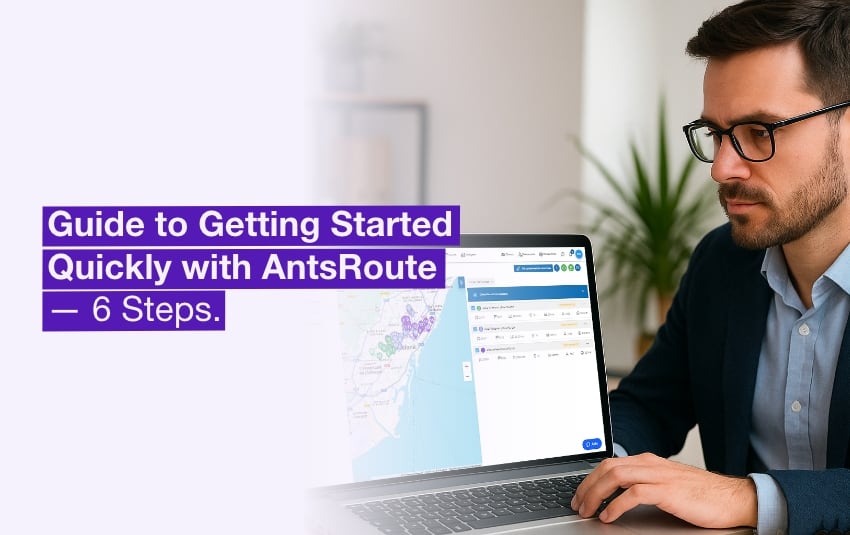Blog > Home healthcare > How Artificial Intelligence is Improving the Logistics of Home Patient Care
How Artificial Intelligence is Improving the Logistics of Home Patient Care
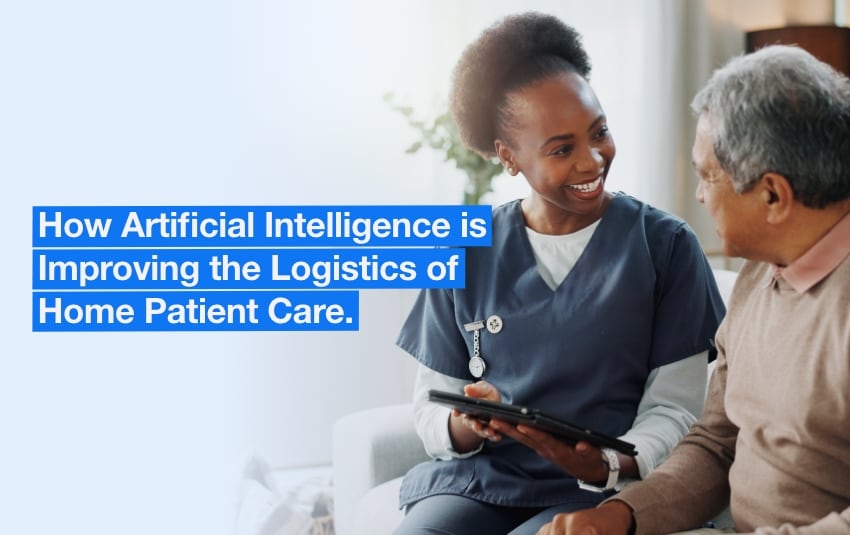
How Artificial Intelligence is Improving the Logistics of Home Patient Care
Published on 6 May 2025 • Reading time: 8 min read
The logistics of home care face many challenges: complex routes to plan, difficult coordination between carers, unpredictable emergencies and administrative overload. And yet, at a time when the population is ageing and chronic illnesses are on the increase, demand for home care is exploding. Artificial intelligence (AI) in medical practices is emerging as a relevant lever for transforming the logistics management of home care, making it more predictive, efficient and even ‘human’.
In this article, we take a look back at the current challenges facing home care logistics and the responses provided by AI, with its strengths as well as its limitations.
Table of contents:
- What are the logistics challenges of home care?
- How can AI optimise carers’ routes?
- What impact will AI have on healthcare professionals and what benefits will it bring to patients?
- Zoom: What is the economic impact on the healthcare system?
- Limits and precautions to be taken in home care logistics
What are the logistics challenges of home care?
Home care management is based on a delicate balance between quality of care and operational efficiency.
The main obstacles include:
- Optimising routes: Poorly organised journeys waste precious time for carers. Geographical, time, equipment and priority constraints make scheduling complex. This time spent on the road or in administrative organisation means less time for patients.
- Insufficient coordination: There are many intermediaries between nurses, doctors, home carers and families, and the flow of information is not always optimal, leading to delays or even errors in the care provided, which can be tragic.
- Difficult to anticipate needs: It is much more difficult to monitor patients continuously at home than in hospital, which limits responsiveness. And because we are unable to predict changes in health status in good time, the prescriptions and care devices provided may not always correspond to the actual state of health, or serious pathologies may not be detected in time.
Beyond the risks they represent for patients’ health, these logistics challenges also represent a major mental burden for professionals and a significant additional cost for healthcare organisations.
Artificial intelligence is seen as a relevant solution for minimising these constraints, to the benefit of both patients and healthcare organisations.
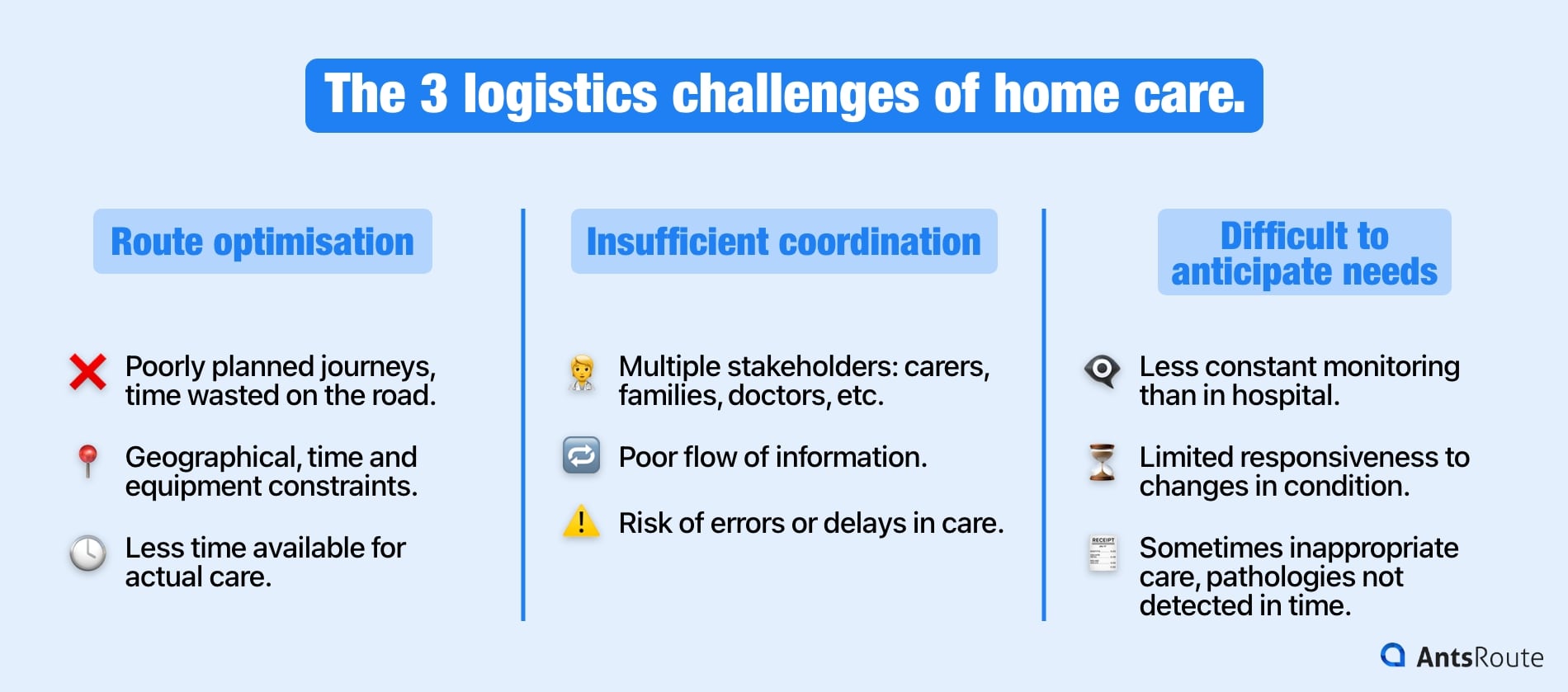
The three logistics challenges of home care.
How can AI optimise carers’ routes?
To enable patients to remain in their own homes, teleassistance or telecare solutions have exploded in recent years. According to a February 2025 study by Berg Insight, 13 million people in Europe were using teleassistance or connected telecare solutions in 2023. This figure is set to rise to 23 million by 2028.
However, telecare services are primarily used for diagnosis and prescription, but not for the care that is essential if patients are to be maintained or hospitalised at home. The logistics challenges therefore remain for doctors and patients, as well as for hospital pharmacies.
To meet these particular logistics challenges, a number of digital healthcare tools and AI-based applications have emerged in home healthcare logistics in recent years.
We have divided them into 3 main areas, according to the functionalities they bring to patients and home care professionals.
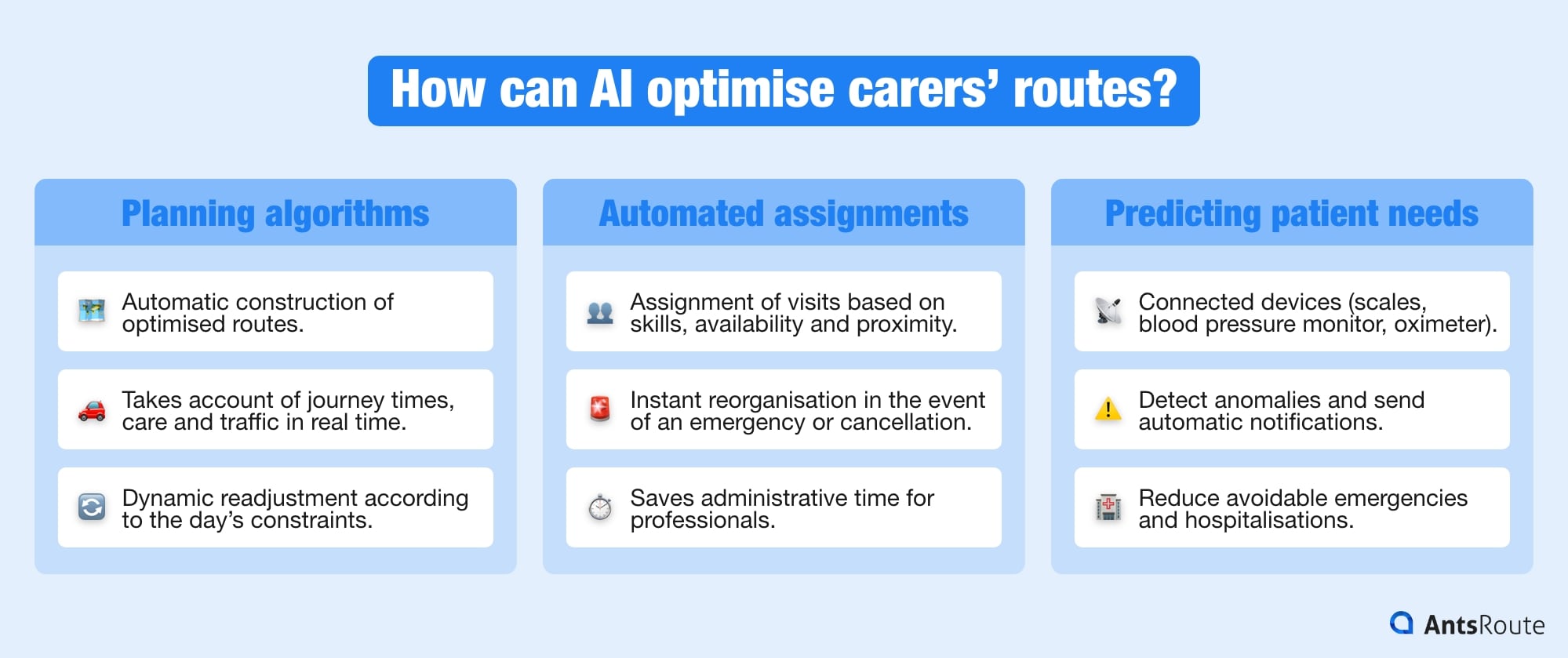
How AI optimises carers’ routes.
1. Intelligent planning algorithms
Freight carriers are no longer the only ones to use software to optimise their routes.
Solutions such as the AntsRoute application use algorithms to create optimised routes and reduce the time spent on the road between each patient. They take into account travel and treatment times, as well as real-time traffic, to optimise the route schedule and readjust it according to actual traffic constraints.
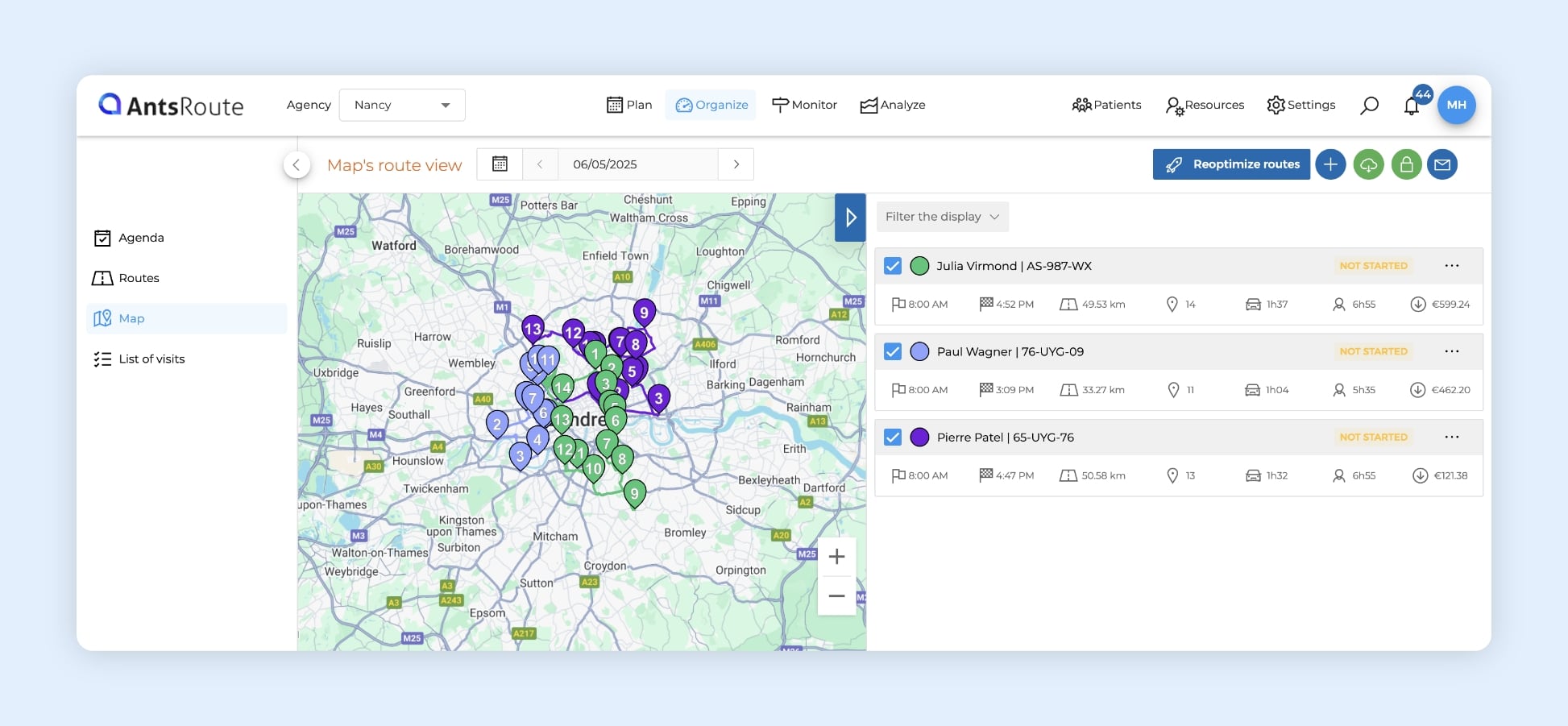
The AntsRoute route optimization software.
2. Automating assignments
AI is also able to allocate visits according to the skills, availability and location of the caregiver. It can also readjust schedules in real time in the event of cancellations or emergencies, or according to clinic priorities and the actual constraints of healthcare professionals and patients. These possibilities are also offered by route optimisation software such as AntsRoute.
3. Predicting patient needs
While it remains impossible to fully predict health problems that have not yet occurred, many pathologies can be monitored more proactively from the patient’s home. And this is made possible in particular by connected health devices.
According to Berg Insight, cellular connectivity for home healthcare devices will increase from 7.8 million connections in 2023 to 14.8 million in 2028, facilitating more responsive and connected logistics.
This involves analysing data from sensors (connected scales, blood pressure monitors, glucose meters, oximeters) and platforms such as Luscii and ImagineCare. The data is transmitted automatically to healthcare professionals, with notifications in the event of any anomaly. This makes it possible to anticipate any deterioration in health and plan preventive action at home using the appropriate healthcare device. According to a study carried out by Imperial College Healthcare NHS Trust on 146 patients hospitalised at home after being newly diagnosed, the Luscii platform reduced emergency room visits by 65% and saved almost €400,000 in hospital costs.
In the United-Kingdom, a solution such as Virtual Wards, implemented by the NHS, has set up ‘virtual units’ enabling patients to receive hospital care at home. Using connected devices (tablets, blood pressure monitors, scales), patients can transmit their health data on a daily basis, which is monitored by professionals. This approach has been beneficial for heart failure patients, sparing them prolonged stays in hospital.

AI makes it possible to monitor a wide range of pathologies proactively from the patient’s home.
What impact will AI have on healthcare professionals and what benefits will it bring to patients?
The benefits are real for patients and carers alike.
For home care professionals, these tools for monitoring patients, optimising routes and automating care via AI are a real mind-saver.
They make it possible to:
- Fewer time-consuming tasks: Less time spent organising routes, making phone calls or re-entering data on different tools.
- Smoother organisation = less stress: Being able to plan their day means greater well-being for carers, with fewer delays, less risk of errors and a greater ability to deal with the inevitable unexpected.
- Back to care: Professionals can focus on patient rather than administration or logistics.
☝️ Take the example of Julie, a self-employed nurse in London, who uses an AI application to automatically plan her routes according to the day’s emergencies, the location of patients and the operations planned by other carers in the area. She saves 1.5 hours a day, which she spends talking to patients or carrying out unscheduled care.
And patients are also triple winners.
These AI-based applications offer them:
- Faster care: Automatic alert systems (fall detection, blood pressure spike, respiratory decompensation) trigger immediate visit or teleconsultation.
- Personalised care thanks to AI: AI adapts care according to the patient’s health profile, habits and vital signs.
- Greater safety: Fewer missed visits, better transmission of information between care providers, and proactive alerts in the event of unusual behaviour.
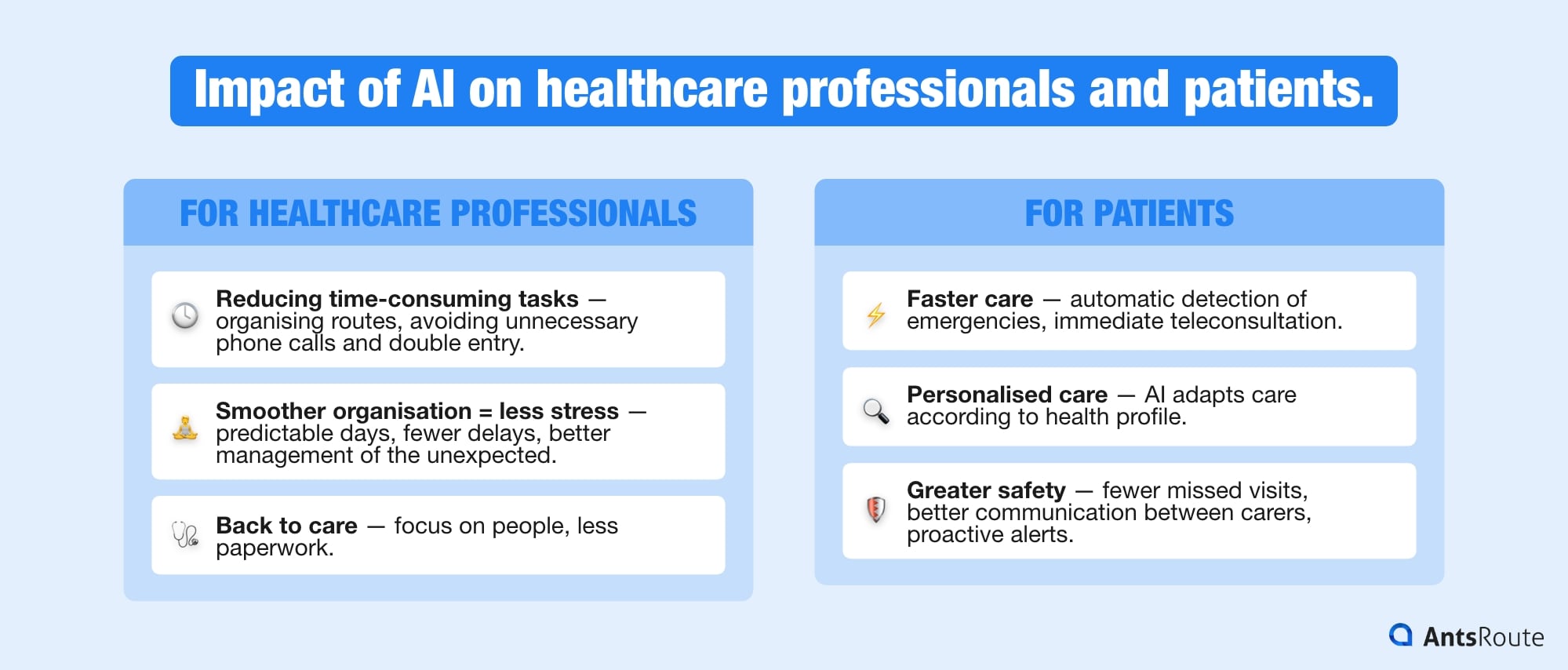
The impact of AI on healthcare professionals and patients.
Zoom: What is the economic impact on the healthcare system?
Integrating AI into home care logistics not only has human benefits, it also has a significant economic impact. For example, UK home care company Cera Care is using AI tools to predict and prevent hospitalisations among the elderly and vulnerable. It claims to have reduced hospital admissions by up to 70%, saving the NHS and the UK government around £1 million a day.
Intelligent route planning can also improve the efficiency of medical routes and reduce the operational costs of home care facilities by up to 20%, by saving fuel, reducing overtime and optimising working time.
Finally, by reducing stress among professionals and making their work more attractive, these tools indirectly help to limit staff turnover and absenteeism, two major sources of hidden costs in the medico-social sector.

Limits and precautions of AI in home care logistics.
Limits and precautions to be taken in home care logistics
The integration of artificial intelligence into home care is also giving rise to legitimate misgivings, which require appropriate practices:
- Health data protection: Access to sensitive data must be strictly controlled in accordance with the RGPD and local regulations, in order to reconcile AI and medical confidentiality. In France, for example, it is essential to encrypt, anonymise and host data on HDS (Healthcare Data Hosting) certified servers.
- Training for carers: Adopting these applications requires technical support, training for healthcare professionals in digital tools and support on the ground (online chat or after-sales service) to make it easier to get to grips with them. It is also important to inform and train patients and answer their legitimate questions.
- Accessibility of tools: Not all professionals have the same tools, the same knowledge, or the same facilities for accessing healthcare technologies. To avoid inequalities in use, applications need to be as accessible as possible, in terms of user-friendliness, but also in terms of integrating the functional or cognitive disabilities of both carers and patients (visual or hearing impairments, dyspraxia, etc.).
- Technological balance: AI must remain at the service of the human relationship and not replace it. The final decision on the merits of a treatment or operation must always remain with the carer.
Artificial intelligence offers huge potential for reinventing home care logistics. It enables professionals to work more efficiently, patients to benefit from more personalised care and the supply chain to become fluid and responsive. The combination of connected sensors, intelligent platforms and powerful algorithms is bringing home healthcare into a new era. But we still need to ensure that these technologies are adopted in an ethical, inclusive and controlled way. Intelligent home healthcare is no longer a promise for the future: it is already a reality that is transforming the daily lives of thousands of carers and patients in Europe.
AntsRoute offers a route optimisation solution that has been widely adopted in the home healthcare sector. Find out more about its concrete benefits and use cases on our website.
WRITTEN BY
Maryline Lakh
Maryline worked for a major logistics company for 15 years. Since 2022, she has been an expert in communication and freelance writer for positive-impact logistics companies. She is passionate about new sustainable logistics solutions and writes for several clients, including AntsRoute.
Optimise Home Healthcare Routes
Free 7-day trial | No credit card required
Contenu
- What are the logistics challenges of home care?
- How can AI optimise carers’ routes?
- 1. Intelligent planning algorithms
- 2. Automating assignments
- 3. Predicting patient needs
- What impact will AI have on healthcare professionals and what benefits will it bring to patients?
- Zoom: What is the economic impact on the healthcare system?
- Limits and precautions to be taken in home care logistics

